Addressing anti-Arab bias after Sept. 11, to the news media
A year after the terrorist attacks of Sept. 11, 2001, I was quickly signed by Creators Syndicate to distribute my column, which I described as “defining the moderate Arab Voice.” The column was tough on governments, tough on extremists and tough on “truth”. On Oct. 29, 2002 I was invited to speak to the Inland Press Association to describe my journalism career covering Chicago City Hall from 1976 through 1992, and my experiences before and after the terrorism of Sept. 11, 2001 as an Arab American, who everyone thinks is Muslim. Here is that speech:
How I’m spending my journalism summer vacation career
SPEECH TO THE INLAND PRESS ASSOCIATION
By Ray Hanania
InterContinental Hotel/Tuesday, Oct. 29, 2002, 12:30 luncheon
Welcome to the unusual world of Ray Hanania.
My career in journalism is better defined by the word communications.
I am or have been … a journalist. A writer. An activist. A radio talk show host on WLS. A media consultant. A syndicated columnist with Creators Syndicate and with the Daily Herald Newspaper in Arlington Heights. An American. And, a comedian. Comedy is a much more sophisticated and most precise form of communications.
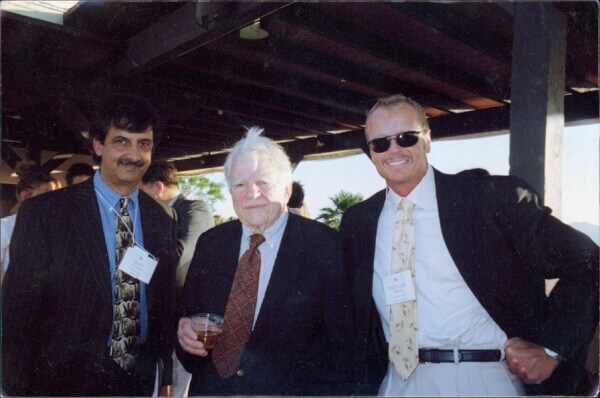
But I am most defined by the fact that I am a Palestinian Arab American. People look at me and they hate me.
Before September 11th and after September 11th. The only difference is that today, more people hate me more.
The only place I could find some protection is in the world of journalism and its big brother, communications. Communications is about reaching people and helping them to understand all of the issues and challenges around us. In America, communications is the basis of power. But there are some problems we have to learn to negotiate: Perception is often reality. And, how you say something is oftentimes more important than what you say.
For the most part, journalists are fair, objective and professional. Sometimes, some journalists are not fair. They believe that if they are fair about issues 80 percent of the time, they can be unfair about a small percentage of issues the rest of the time.
That’s how I feel the problem is with journalism and the issues of the Middle East. Journalists who are often very fair on all kinds of issues, demonstrating impeccable integrity on issues involving women, civil rights between Blacks, Whites and Hispanics, local politics, and the social needs of the downtrodden, exploited and underprivileged.
But when it comes to the Middle East, some journalists seem to think its okay to be unfair, one-sided, and wrong. It’s okay to advocate for Israel and to ignore the Arab viewpoint.
Let me explain what I mean in short vignettes from my life:
VAMPIRES
I’m not your typical American and I am not your typical Arab American. I understand journalism and I understand America. I see life as a baseball game. It isn’t enough to understand that you have to hit a ball with a bat. That doesn’t make you a baseball player. You need to understand batting form, pitching technique and even baseball strategy.
A sacrifice fly is not an act of humiliation and surrender.
The problem with most Arab Americans is that they are here physically but mentally back in the Middle East. Part of the reason is our fault. Part of the reason is your fault. We all share some blame.
Human beings have a need to see ourselves reflected in the life around us. As an Arab American, I don’t see my reflection at all. I see a vacuum. I look in the life’s largest mirror, the media, and I don’t see my reflection. I start to think that maybe, I’m a vampire. People look at me and I see misunderstanding, fear and hatred in their expressions.
Many Arabs respond by being defensive, and they view the society around them as hostile. This breeds extremism. The moderates are pushed down.
Arab Americans need to engage society through communications as participants, not victims. We need to understand that bottom line is not to win the debate, but to win the audience.
REAVIS HIGH SCHOOL
I am a child of the television and Hollywood media. I wasn’t deterred by the fact that nearly every terrorist in every movie looked like one of my uncles.
I had my first taste of journalism during my junior year in High School. I had flunked English Comp 101 three times. Instead of abandoning me like other poor performing students, a special kind of teacher, Mrs. Harris, who taught English and was the advisor to the school newspaper, decided she wasn’t going to give up. She asked me, what do you like to do? I play lead guitar. Hendrix. Led Zeppelin. Grand Funk Railroad. She said write a column on new rock music albums for the newspaper.
Man, did I see the power of journalism. In my senior year, I was named the newspaper’s Editor & Chief. One of my first editorials was on the unfairness of how the Arabs were portrayed in the news media. I was the only Arab student in the school
Watergate was fresh on my mind when my draft number prompted me to enlist in the Air Force during the Vietnam War.
AIR FORCE
I found my epiphany in 1974 sitting in a one bedroom trailer in a desert just outside of Sheppard Air Force Base in Witchita Falls, Texas sitting in front a television set. On my TV screen, I watched three people debating the Middle East. One was the program host, Irv Kupcinet. The other two were guests. One was the Jewish spokesman who looked like my next door neighbor in Chicago. He calmly explained the Israeli point of view, painted a vivid and compelling portrait of a struggling Israeli people. He dressed like an American. Sounded like an American. Looked like an American. His message was American.
Opposite him was the other guest, the Arab spokesman. He looked like one of my uncles, still wearing his refugee clothes from the 1948 war. Heavy accented, he wasn’t calm at all. He was emotional. And angry.
Incomprehensible. I couldn’t understand what he was saying and I was an Arab. He dressed like a foreigner. He sounded like a foreigner. He looked like a foreigner. His message was foreign.
SOUTHTOWN ECONOMIST
I grew up with a community newspaper that seemed fair about everything except issues relating to Arabs and the Middle East. Every week, it would publish columns, editorials and Op-Eds that harshly criticized Arabs and ridiculed the Arab view.
One day, I decided complaining about the media wasn’t enough. Saying it was controlled seemed stupid. I sat down and wrote an 8-page rebuttal to a column that provoked me with the assertion that Palestinians — me, my father and my family — didn’t exist. We were an imagination. In 1976, I walked it into the editorial offices of the Southtown Economist newspaper and demanded to see the editor.
H. Marlin Landwher was an imposing person. He stood over six feet tall. Had serious eyes of a person who had seen a lot of tragedy, or at least a lot of angry readers. His desk was right there in the middle of the news room. People scurried around him just like in that movie, The Front Page.
I slapped the letter on the desk with all the protest I could muster. It wasn’t typed. It was written long hand. Landwher reached out, picked it up and as I stood there, quietly read every word. When he was done, he said to my surprise, “No one has ever come in here and written the Arab viewpoint before. You’re the first, young man.” He published the letter that Sunday.
And, every week thereafter, I wrote a letter that he published. It was that easy. I wrote to publications like Time, Newsweek, and the New York Times. Wow. How powerful it is to have your words published in the media.
People in the Arab community started noticing. Arab organizations invited me to speak to them about how I did what I did. They asked me to be their spokesperson, and several months later, at age 23, I found myself on a national TV panel show debating the Middle East. On my right was Israel’s most eloquent spokesman and Foreign Minister, Abba Eban. On my left was, you know who … Irv Kupcinet.
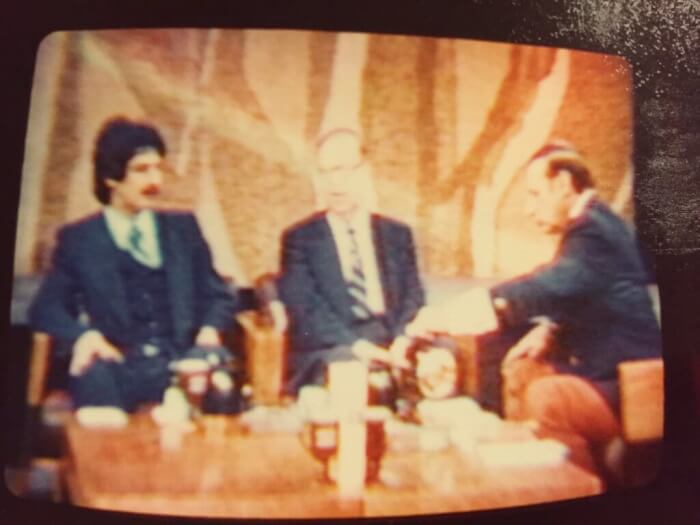
Eban tried to provoke me to emotion, saying, “Palestinians didn’t exist.” … “I don’t exist?” I replied. “My father’s name is George Hanania. Hanania is a Hebrew word that means ‘God has been gracious.’ His family lived in Jerusalem for hundreds of years. Yet, my father doesn’t have the right to move to Jerusalem and live there. His home is occupied by Russian immigrants.”
“But your name is really Aubrey Solomon. You were born in South Africa. Why do you have more rights than my father?”
HIRED BY THE NEWSPAPER
I wanted to be a journalist. I went to a local newspapers, the Messenger Press, and asked if I could write features. The community where I lived was involved in recycling newspapers to raise money for a local school for disabled children. Homeowners put bundled papers by the curb next to the garbage. The night before, a guy drove around and grabbed the papers. I took his picture, stopped and interviewed him, and asked, “Why are you doing this?” I wrote my story. The editor paid me 25 cents a published column inch. My first check was for $25, for a two-page spread with photos.
One day, Landwher called my home. He spoke to my mother who answered the phone. Those were the days when we didn’t have answering machines. People had to get the story right the first time they heard it and we didn’t rely on computers or machines. He said he had a job opening and had to be at his office the next morning.
He liked my expose on the recycled newspaper thief. It wasn’t a big story about politics, budgets or who was going to be president of the United States. It was a local story.
I had no journalism schooling and I don’t know why he hired me. But I suspected, it was an easy way to get this angry letter writer off his back.
In early 1978, the Chicago Daily News planned to close. The Southtown’s publisher decided to change our weekly newspaper to a daily. He asked the news room, does anyone want to go to City Hall and carve out a beat? Not a peep. City Hall was a long drive from our suburban offices. More importantly, the beat was boring and Mayor Bilandic was not a newsmaker. I didn’t go to journalism school, so I didn’t see that pitfall. So, I raised my little Arab hand. It sounded cool. I became the Daily Southtown’s new City Hall reporter. That Winter, Bilandic’s Chicago Machine forgot how to shovel snow. And Jane Byrne became Mayor.
FIRST DAY AT THE HALL
On my first day, I was introduced to Harry Golden Jr., the Dean of the City Hall press corp and the beat reporter for the Chicago Sun-Times. Harry was a survivor … of the Front Page Era of Journalism. He was a former, hard-core alcoholic with a Brooklyn accent and a mind that could clearly decipher an Irish brogue. Golden was a brilliant reporter who lived on facts, eschewed opinion and personal views. He wrote the truth.
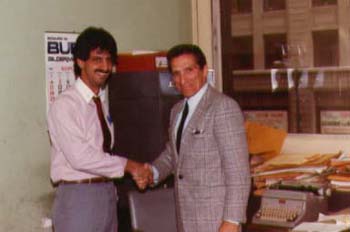
Golden showed me the most important artifact in the City Hall Press Room. In a raspy Brooklyn voice that could scare the most determined Department of Motor Vehicles bureaucrats, Golden taught me Rule #1.
Golden pointed to a copper key cradled amid a pile of paper clips and affectionately chewed No. 2 yellow pencils. He said, “This key is the most important thing in this room.”
As the other reporters watched, Golden led me through the inner sanctum of a secret initiation. The key opened the door to a cabinet. He pointed across the room. The cabinet was old. Its paneling looked like balsa wood that was splitting and curling. Pink colored paint was chipping off.
Golden lifted the key from the drawer and carefully inserted it into the lock with the respect of a man opening an ancient copy of the Bible. The doors squeaked opened.
The first thing I saw was an old black and white TV. Inscribed across the top were the words “Property of the Palmer House.” “You stole this TV?” I asked.
“Aaaaarrggghhh. Aaaaarrggghhh. Aaaaarrggghhh” Golden cackled with a laugh that had years of training. Between the TV and the cabinet walls, were dozens of bottles of Crown Royal in plush, blue velvetine bags. Silvered boxes of Chevas Regal. And many unsheathed bottles of half-emptied Stolichnaya.
I looked with bewilderment. That’s the secret to journalism?
Golden barked words I would never forget: “You only have two things as a journalist. You have your honesty. And you have other people’s trust.”
SEPTEMBER 11th
I didn’t have to go out and buy an American flag like a lot of my neighbors did on Tuesday, September 11th, 2001. I already owned one. Actually, I owned two, the other the flag the military gave my mom when my dad died.
Suddenly, the flag has become like everything else in society. Fast food. Fast news. Fast facts. Patriotism has transformed. It’s snap-on patriotism based on hysteria and hatred. Doesn’t anyone thing it’s cheesy to snap on so many flags on our car windows, and drive down a street littered with flags that have fallen off and abandoned?
I am very proud to be American. I am also proud to be Palestinian Arab.
I don’t blame Muslims and Arabs for the terrorism of the world today. I blame it on events, and fanatics and on bias and misunderstanding.
Days after September 11th, a man sent me an email claiming he was my neighbor. He signed his name and threatened me. He didn’t like my views in support of Palestinian rights and believed that my support of Palestinians was a cause for the terrorism against the World Trade Center and our nation.
I called the police. What does it say about a society and environment when a man feels comfortable threatening violence and signing his name to the threat? The police confronted the man and he said he was tired of those “Ay-rabs” coming to HIS country which he fought to defend. The police, who know me, said I fought during the Vietnam War. My father fought in World War II. And the man was shocked. He said he didn’t know. He was sorry.
MODERATION
You didn’t think I was going to end without talking a little about the focus on my columns in the Daily Herald or Creators Syndicate, did you?
How do we fight extremism and terrorism? We don’t rely on stereotypes. We fight it with education and by standing by the principles of a Constitution that has proven time and time again that it works.
We fight it by encouraging moderation and fighting extremism.
Today, extremists control the Middle East because the voices of moderation are not being heard. In the United States, most Americans can’t tell the difference between a Palestinian or a Pakistani. They don’t know the difference between a moderate and an extremist, partly because our critics treat moderates as extremists. Pro-Israel advocates prefer the extremists to me. Moderation undermines their claims. Extremism strengthens their hand.
The media is a part of the problem, too.
On September 11th, I gathered with the leaders of 25 Arab American organizations and held a press conference to denounce the terrorism and declare that we are Americans, too, and we stand with America. Down the street, two religious fanatics who refused to join us and called a press conference of their own. We put out a statement on the news wires. The media ignored us and covered the fanatics, the better story. They said Sept. 11th was the result of “American Foreign Policy.”
That’s ridiculous, but that was the story. Two fanatics make a better story than 25 moderate Arab Americans.
Arab Americans flip through the pages of our media every day. We don’t see our voices, yet there are more than 3.5 million Arabs in this country and some 7 million Muslims. Not all Muslims are Arabs and half the Arabs in America are Christian like me. We are a growing audience and market. We are becoming more and more a part of the American process, too.
If you want to fight extremism, encourage not discourage the voices of moderation. Open the media doors and invite us in. Moderation isn’t about expressing a viewpoint people agree with. Moderation is the ability to argue a point with passion and emotion while still focusing on a moderate goal.
Moderation is about intent, not intensity. Moderation is common sense, not common views. Moderation is about adding voices of diversity and remaining true to a single standard for all people, Arabs and Jews, too.
MIDDLE EAST POLITICS & MODERATION
My intent is peace. My intent is compromise. My intent is recognizing reality. Israel has a right to exist.
Hamas is a terrorist organization. Suicide bombings are wrong. Not just because they don’t work, but because it is immoral to lead someone to kill themselves and to kill other innocent people, civilians, in the process.
I don’t believe in the Biblical view that “the enemy of my enemy is my friend.” That’s wrong. I don’t want anti-Semites to stand with me in their hatred of Jews and say I am right. I want to fight them as strongly as I fight others who I believe are wrong.
I also believe that as a moderate, I can have these views and still argue some very strong issues about things that Israel is doing wrong. I am not talking about criticizing Jews or Israelis as a people or a culture or a religion.
I am speaking about criticizing governments. Criticizing policies. Criticizing military actions.
Resistance is not terrorism if a civilian population believes that is the only way to defend oneself from a larger, much stronger military assault. My people live in an occupation of brutality and squalor based on policies that are immoral and wrong. Collective punishment, the act of punishing the relatives, families and friends of a suicide bomber, is wrong. But if they just did it to them, it would be different. But they don’t. They punish whole villages and communities for the acts of others.
It was bad before September 11th and it is worse today.
GOOD STORIES ARE OUT THERE
I like to write about the stories that others don’t want to write about or few want to hear.
My views on the Middle East have made me a target of Arab and religious, extremists. But, I also ask the questions that make me unpopular with Americans, too.
Why don’t we write more about the 14 people who looked Middle Eastern who were murdered as a result of September 11th? Shouldn’t their families also receive financial assistance? Didn’t they die as a result of p-11 related bigotry and hate crimes?
Why won’t President Bush allow a full investigation of September 11th? Because what we know fits the circumstances?
I don’t want to wait 35 more years to learn that mobsters and Fidel Castro were involved in the murder of JFK.
I don’t want to wait 35 years to learn that the Gulf of Tonkin resolution was based on a lie and many of my friends died because of that lie in a war we could have avoided?
MIDEAST CONFLICT
When a Palestinian is killed it’s a statistic. When an Israeli is killed, it’s a feature story with every detail of their life laid out in total sympathy. We know the Israelis who are killed like our own family members. The Palestinians are statistics and strangers.
There are three real causes for the violence in the Middle East.
The first is that President George Bush is an inexperienced foreign policy leader with a conservative voice. Despite the experience of his cabinet, which is divided, Bush sent a signal in the early days of his administration to leaders of the Middle East that he was going to abandon his predecessor’s strategy of forcing the two sides together and let them do it themselves.
That’s like a father saying to two quarreling siblings, go at it kids.
But, in the Middle East, one kid is far stronger and more powerful than the other.
The Second cause was Ariel Sharon himself. His declaration at the al-Aqsa Mosque declaring Israel shall never surrender Jerusalem was intended to do two things. One, he wanted to provoke the Palestinians into reaction, an easy thing to do to a people living in despair and frustrated by a seven year long Middle East peace failure that brought nothing for them. Two, he wanted that Palestinian reaction to help him win the Israeli elections.
Sharon is a longtime foe of peace and compromise with the Palestinians. He was on record denouncing the plan for a Palestinian State. In the late 1970s, his Likud Government was partly responsible for encouraging the creation of an Islamic alternative to his nemesis, Yasir Arafat, and that Islamic alternative has turned into a monster that he helped midwife.
The third cause is Yasir Arafat himself and his inability to control his growingly weary people. Arafat is a great revolutionary but a poor government leader. He is an especially poor negotiator and sent the wrong signals regarding the issue of the Right of Return, for example.
Put these three causes together, and we find ourselves instead of hopefully wishing for peace, fearing the future.
These are the issues I write about at the Daily Herald Newspaper and for Creators Syndicate. I’m not always going to ask the questions you like or address the popular issues. But can we as a society continue to not have my views on the pages of our newspapers more often.
Thank you very much …
Ray Hanania


- Israelisnipers shooting and killing hospital workers in Gaza - December 11, 2023
- CAIR Condemns Israeli Executions of Wounded, Unarmed Palestinian in West Bank - December 11, 2023
- Arab and Muslim American voters face a “simple choice” between Biden’s inhumanity and Trump’s edgy politics - December 9, 2023













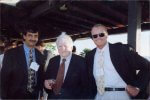






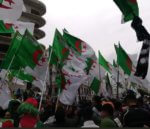


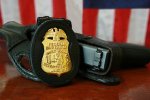


Comment on “Addressing anti-Arab bias after Sept. 11, to the news media”